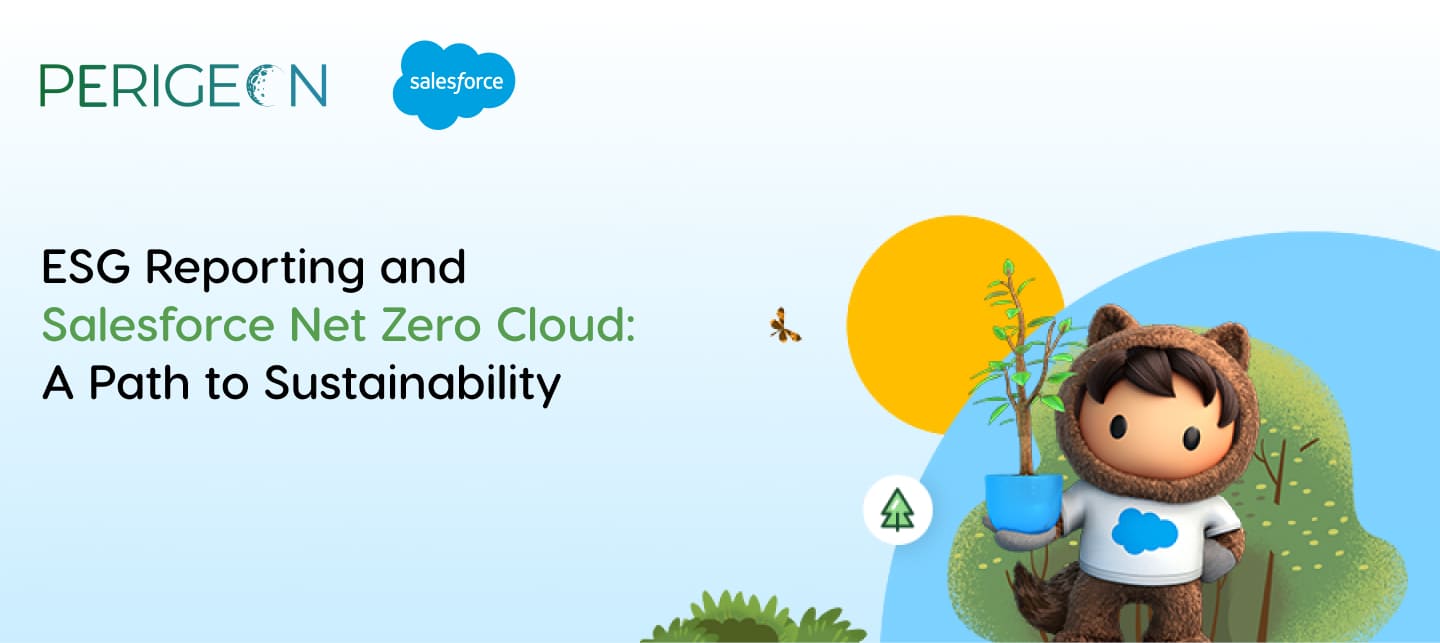As environmental, social, and governance (ESG) considerations become integral to corporate strategies, businesses are under increasing pressure to report on their sustainability efforts. Effective ESG reporting not only ensures regulatory compliance but also builds trust with stakeholders and drives long-term business value. Salesforce Net Zero Cloud is a powerful tool designed to simplify and enhance ESG reporting, enabling organizations to track, analyze, and act on their sustainability data.
This blog delves into ESG reporting, why it matters, and how Salesforce Net Zero Cloud meets the growing demand for sustainability management.
What is ESG Reporting?
ESG reporting is the process of disclosing a company’s environmental, social, and governance performance to stakeholders, including investors, regulators, employees, and customers. It provides insights into a company’s impact on the environment, its relationships with employees and communities, and its governance structure.
Why ESG Reporting Matters
1. Regulatory Compliance
Governments and regulatory bodies are increasingly mandating ESG disclosures, making accurate and timely reporting essential to avoid penalties.
2. Investor Demands
Investors are prioritizing ESG metrics in their decision-making, favoring businesses that demonstrate a commitment to sustainability.
3. Brand Reputation
Consumers are more likely to support companies that align with their values, particularly regarding environmental and social responsibility.
4. Operational Efficiency
Tracking ESG metrics helps businesses identify inefficiencies and reduce waste, resulting in cost savings and improved performance.
Salesforce Net Zero Cloud: Meeting the Challenges of ESG Reporting
Salesforce Net Zero Cloud rises to the challenge of modern ESG reporting by providing a comprehensive platform for sustainability management. It enables businesses to:
- Aggregate and analyze ESG data in one centralized platform.
- Automate the calculation of carbon footprints.
- Set and track science-based sustainability targets.
- Comply with global ESG reporting standards like CDP, GRI, and TCFD.
Key Features of Salesforce Net Zero Cloud
1. Data Aggregation in One Place
Salesforce Net Zero Cloud consolidates ESG data from multiple sources, such as utility providers, suppliers, and internal systems.
- Use APIs to integrate data from ERP, IoT devices, and external databases.
- Centralize emissions, energy usage, water management, and waste metrics.

2. Calculation of Carbon Footprint (Carbon Accounting)
The platform automates carbon footprint calculations across Scope 1, Scope 2, and Scope 3 emissions.
- Use built-in formulas and emission factors for accurate results.
- Track emissions from energy use, transportation, and supply chain activities.

3. Energy Use Records
Monitor and manage energy consumption across facilities to identify inefficiencies and opportunities for renewable energy adoption.
- Gain insights into energy usage trends.
- Optimize energy sourcing and consumption patterns.
4. What-If Analysis
Simulate scenarios to assess the impact of sustainability initiatives before implementation.
- Predict how switching to renewable energy or reducing waste affects your carbon footprint.
- Make data-driven decisions with confidence.
5. Emissions Factors and Science-Based Targets
Incorporate emissions factors to understand the environmental impact of activities and align with science-based sustainability goals.
- Align targets with global frameworks like the Paris Agreement.
- Monitor progress toward achieving net-zero emissions.
6. Water Management
Track water usage, recycling, and waste to improve water conservation efforts.
- Measure water consumption across facilities.
- Identify areas for improvement in water management practices.
Benefits of Using Salesforce Net Zero Cloud for ESG Reporting
1. Simplified Reporting
Generate reports compliant with global ESG frameworks, saving time and ensuring accuracy.
2. Improved Transparency
Provide stakeholders with real-time insights into your sustainability performance.
3. Enhanced Decision-Making
Use analytics and what-if scenarios to optimize sustainability strategies.
4. Regulatory Readiness
Stay ahead of evolving ESG regulations with automated compliance features.
How Perigeon Can Help
As a trusted Salesforce Consulting Partner, Perigeon helps businesses implement and customize Salesforce Net Zero Cloud to maximize its impact.
Our Services Include:
- Platform Implementation: Tailor Net Zero Cloud to your organization’s ESG needs.
- Customization: Configure dashboards, workflows, and reports to align with your sustainability goals.
- Data Integration: Connect Net Zero Cloud with existing ERP, CRM, and IoT systems.
- Training and Support: Equip your team to effectively use the platform for ESG reporting.
- Continuous Optimization: Provide ongoing support to refine ESG strategies and reporting processes.
Conclusion
Salesforce Net Zero Cloud is a game-changer for ESG reporting, providing businesses with the tools to measure, manage, and communicate their sustainability efforts effectively. By automating carbon accounting, tracking energy use, and aligning with science-based targets, businesses can meet regulatory requirements, satisfy stakeholder expectations, and drive meaningful environmental impact.
Ready to transform your ESG reporting? Contact Perigeon today to explore how Salesforce Net Zero Cloud can support your sustainability journey.


